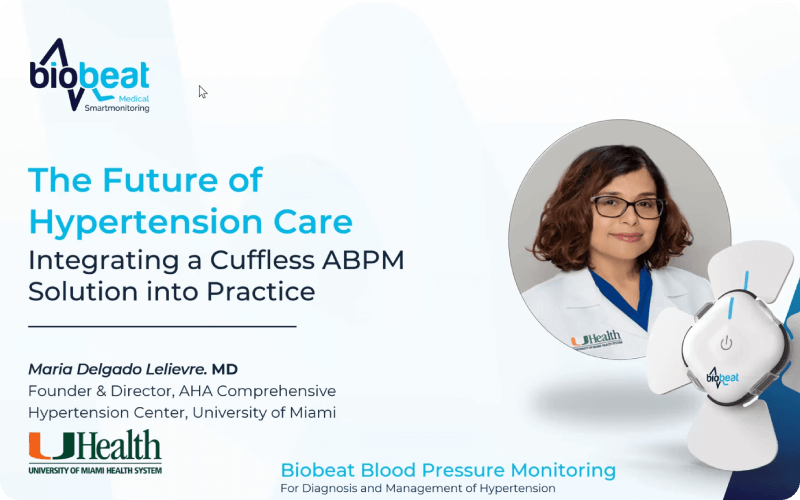Did you catch Biobeat’s latest webinar on integrating a cuffless ABPM into practice?
If not, don’t worry! The full recording is available to watch on-demand by clicking here.
Alternatively, read our overview below for a quick summary.
This webinar, led by Dr. Maria Delgado, Assistant Professor of Medicine and Director of the AHA-certified Hypertension Centre at the University of Miami, explored the challenges of managing hypertension and the transformative role of cuffless 24-hour ambulatory blood pressure monitoring (ABPM) using Biobeat’s wearable technology.
Hypertension remains a major global health issue, with one in four patients experiencing uncontrolled blood pressure. Traditional 24-hour ABPM is the gold standard for assessing blood pressure variability and treatment efficacy, yet access remains limited due to cost, discomfort, and logistical constraints. Only a small percentage of patients currently undergo 24-hour monitoring, often leading to incomplete data and suboptimal care.
Dr. Delgado highlighted the practical and clinical limitations of traditional cuff-based ABPM devices, which are bulky, painful, and intrusive, often distorting patient behaviour and compromising the integrity of readings. In contrast, Biobeat’s FDA-cleared, CE marked, cuffless ABPM patch provides a discreet, pain-free, and highly scalable solution. Worn on the chest and connected via Bluetooth to the patient’s smartphone, it collects data every 15 minutes over 24 hours, providing up to 96 data points without interrupting daily activities or sleep.
Since adopting Biobeat, Dr. Delgado’s clinic has significantly expanded its ABPM coverage, from limited access with only four traditional devices to widespread deployment across all hypertensive and hypotensive patients, regardless of socioeconomic status. This shift has empowered clinicians to observe true blood pressure patterns, including nocturnal dipping, circadian rhythm disruptions, and treatment response, leading to more precise, patient-specific interventions.
Cuffless ABPM has also improved patient understanding and engagement. Patients often review their own reports ahead of consultations and gain insight into blood pressure variability as a natural physiological process, reducing anxiety about single high readings. This collaborative data-sharing strengthens the doctor-patient relationship and encourages adherence to treatment plans.
From a systems perspective, the Biobeat platform integrates seamlessly with EHR systems like Epic and supports HIPAA-compliant, cloud-based data analysis. The device is generally well tolerated, with minimal cases of skin irritation or Bluetooth disconnection. Limitations include the need for a compatible smartphone, making the device less suitable for a small number of elderly patients without access to such technology.
The device has demonstrated consistent performance across diverse populations, including those with different skin tones, BMI ranges, and comorbidities like sleep apnoea or atrial fibrillation.
In conclusion, cuffless ABPM using Biobeat’s patch marks a significant advancement in hypertension management, offering a scalable, patient-friendly alternative that enhances diagnostic accuracy, treatment personalisation, and public health outcomes. Dr. Delgado and her team are planning to publish real-world clinical findings later this year, reinforcing the growing evidence for adopting this technology as a standard of care.
